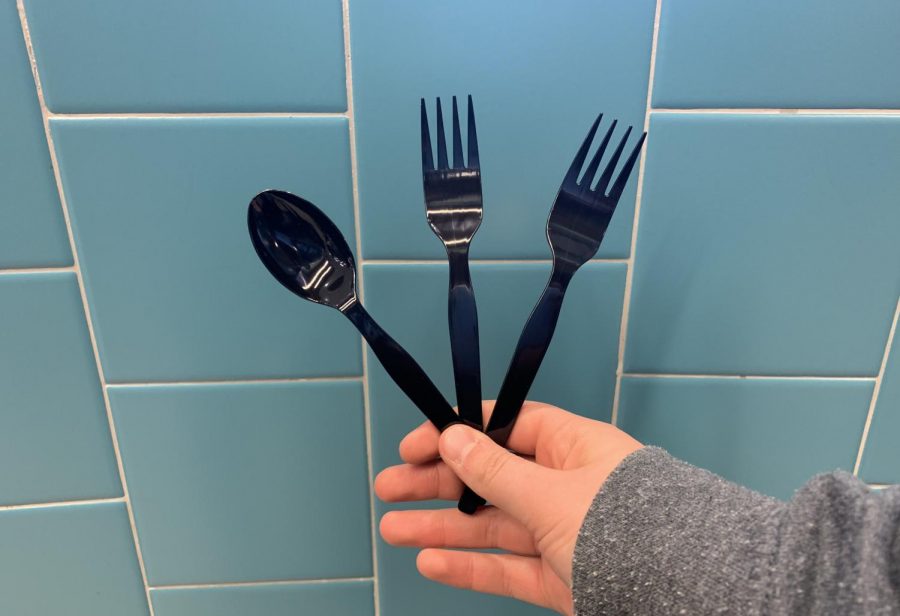Concern grows over environmental impact of plastic utensils
Debate over use of plastic versus metal utensils in cafeteria continues
New Trier’s cafeteria has made efforts toward environmental sustainability, but plastic utensils are still the only tableware offered to students.
With no reusable alternative, students have no choice but to contribute to the waste of single-use plastics.
Eight million metric tons of plastic are dumped in the oceans each year, six million of which are single-use plastics including forks, knives, and spoons. Americans throw away 100 million plastic utensils every day, unknowingly contributing to ocean pollution. In comparison, metal utensils last for decades, and are seen as an eco-friendly replacement.
“Aluminum utensils are better than plastic, because plastic can only be recycled a finite amount of times, whereas aluminum can be recycled an infinite amount of times,” said senior Stella Cook, co-head of NT’s Environmental Club.
The energy required to wash metal utensils, or silverware, is less harmful than the waste produced by transporting plastic utensils to the landfill and disposing of them, according to a study by the University of Chicago.
Metal utensils also pose benefits from a financial standpoint. A 2014 study from the Minnesota Pollution Control Agency estimated that over three years, a school using metal rather than plastic would save $23,000. A one-time investment in metal tableware would be substantially less than buying new plastic utensils for every school day.
The study also saw a 6,000-pound reduction in waste after switching to metal. Greenhouse gas emissions and water consumption decreased 77% over one year, and were estimated to decrease 88% over three years.
Some students prefer metal not just for environmental reasons but for personal preference. Senior Erin Murdoch said, “[Metal utensils] are good for the environment, and they break less.”
Junior Jack Greco agreed, saying that he prefers metal utensils because they are “easier to cut with.”
While the majority of students agree that metal utensils are better for reducing waste, some feel that plastic is more convenient.
“Students have to return metal utensils [to the cafeteria], but can take plastic anywhere in the school,” said junior Ryan Ball.
Senior Jonathan Taylor added, “I think metal is better for the environment, but plastic is less to clean.”
A potential drawback of metal utensils is the need for cleaning. Dishwashers and staff would be required to ensure the daily washing of silverware. There have been no problems with the current cafeteria setup of all-plastic tableware, and plastic utensils are more convenient, but only in the short term.
There is a long-term environmental cost that can’t be ignored. With around 3,000 students at the Winnetka campus, many of whom use forks and spoons in the cafeteria daily, there lies an opportunity to cut down on the school’s plastic consumption.
With increasing social awareness about the dangers of plastic waste, governments and corporations have started to take action.
France has been pushing to ban plastic water bottles in schools. In July, Seattle banned plastic straws and utensils in bars and restaurants, and Starbucks plans to remove plastic straws from all stores by 2020.
The European Union also drafted a ban on plastic products that will go into effect in the next few years.
It seems the plastic we throw away is gone once it’s picked up by garbage trucks, but garbage in the Chicago area is taken to transfer stations, where it is then dumped in one of four landfills within 100 miles of Chicago. In locales without waste collection services, trash is dumped into lakes and oceans.
The Great Pacific Garbage patch has grown to more than twice the size of Texas, and is composed of an estimated 80,000-100,000 tons of plastic. Such pollution kills marine life and is even beginning to harm humans as plastic concentration in seafood and drinking water rises.
The solution to plastic pollution seems simple: reduce the use of plastic products. It is important to recycle plastic when it is used, but most recycled plastic ends up being thrown away.
In the last few years, New Trier has added filtered water fountains to replace and refill bottles, and the environmental club issued reusable Nalgenes to all students in 2017. There has been an effort to reduce plastic bottle waste — it would seem logical to reduce plastic utensil waste next.
“The administration has shown that they are interested in being more sustainable in the past, but I think it’s important for students to let them know that [reducing plastic] is something they want as well,” said Cook. “We don’t always see the effects of our waste.”







































